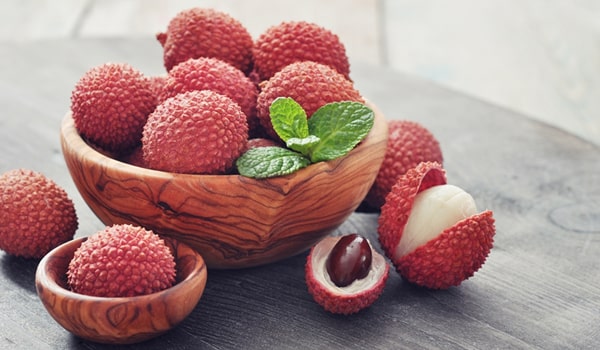Lychees are also known as litchi or lichee, a small tropical fruit belonging to the soapberry family. They are grown in sub-tropical regions around the world. The fruit is native to China and Southeast Asia. Known for their sugary taste, lychees are consumed in its raw form. The fruit is covered with a pink-red skin which is peeled before eating. Other than that, they are also used with ice cream and processed juice.
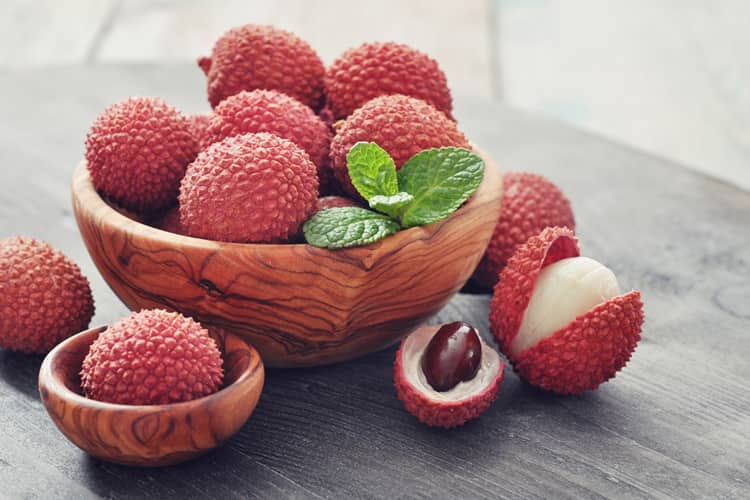
Source: healthy-sporty-beautiful.com
They are a nutritious fruit packed with vitamins and minerals. We have listed all the lychee benefits for you to follow below:
What are Lychees?
The scientific name of lychees is Litchi Chinensis from the soapberry family. It is the lone member of its genus. The fruit bearing tree is grown in subtropical and tropical climates. It is originally grown in China. Lychees have a floral fragrance and are often added to cocktails and dishes because of their distinctive scent. The fruit is mostly consumed as a dessert in Asian countries and is popularly grown in several other parts of the world.
The native fruit of China is widely cultivated in several nations including Southeast Asia, India, China, and Southern Africa.
The fruit has a soft, pulpy, white or pink tint of color and the size is about two inches in height and width. They are best known for their medicinal values.
Nutritional Facts Of Lychees :
Lychees contain 82% of water and 16.5% of carbohydrates. Find the table below for showing Lychee Nutrition, Calories of both dried and fresh ones.
| Nutritional Facts: Lychees Raw- 100 grams | ||
|---|---|---|
| Amount | ||
| Calories | 66 | |
| Water | 82% | |
| Protein | 0.8 g | |
| Carbs | 16.5 g | |
| Sugar | 15.2 g | |
| Fiber | 1.3 g | |
| Fat | 0.4 g | |
| Saturated | 0.1 g | |
| Monounsaturated | 0.12 g | |
| Polyunsaturated | 0.13 g | |
| Omega-3 | 0.07 g | |
| Omega-6 | 0.07 g | |
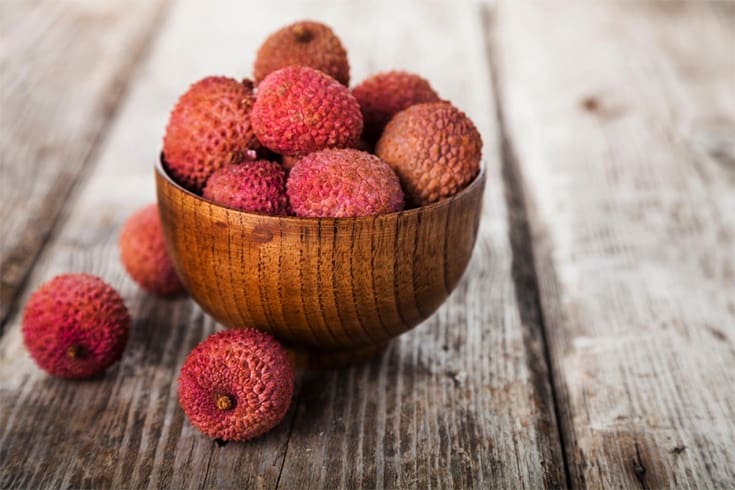
Source: travelgluttons.com
Carbohydrates And Fibers:
- Lychees are rich in carbodydrates. One single lychee is said to contain 1.5-1.7 grams of carbs.
- Most of the carbs present in lychees are derived from sugar, which are known for their sweet taste. They also have low fiber content.
Vitamins and Minerals:
Lychees are a rich source of vitamins and minerals, including Vitamin C.
- Vitamin C- Lychees are richly packed with Vitamin. One lychee provides about 8% of the daily intake of vitamin.
- Copper- Lychees are adequately packed with copper. Insufficient intake of copper may have serious side effects on heart health.
- Potassium- It is an important nutrient known for improving heart health.
Antioxidant Plant Compounds:
- Lychees are a richly packed with antioxidant plant compounds.
- They contain an antioxidant known as epicatechin which can greatly improve heart health and lower the chances of diabetes and cancer.
- The fruit also contains Rutin, an effective antioxidant. Researchers have indicated that lychees can protect against cancer, heart diseases, diabetes, etc.
Oligonol:
Lychees contain Oligonol which is a great dietary supplement. They are a patented mixture of antioxidants derived from lychee skin.
Benefits of Lychees:
Lychees contain a rich content of vitamins, antioxidants, and fiber. According to Lychees Online, lychees are packed with more Vitamin C compared to apples, lemons, and oranges.
We have categorized the lychee benefits below. Take a look.
Lychees for Health:
The lychee seeds contain pain-relieving agents. It is traditionally taken in the form of tea made from powdered seeds. People from North India use powdered lychee seeds for fighting against digestive disorders and killing intestinal worms. It benefits the health in a lot of ways:
1. Contain Flavonoids and quercetin:
Flavonoids contain antioxidant agents which are commonly found in fruits, veggies, spices, and herbs. They are known to prevent chronic diseases like cancer and heart disease.
The fruit also contains quercetin, an effective antioxidant with anti-inflammatory agents.
2. Antioxidant Protection:
Antioxidants are an effective method for providing your body cells with enough defenses against free radicals. If your body does not get enough antioxidant supply, then it will lead to further organ damage. Various studies have shown that its benefits can help in the maintenance of good health. It can also lower the risk of heart disease, cancer, and Alzheimer’s and Parkinson diseases.
3. Improves Heart Health:
Litchi can bring the blood pressure under control by protecting against heart strokes and other heart related diseases. One glass of litchi juice is said to normalize the heartbeat. They contain a high presence of polyphenols which is said to promote heart health. The antioxidant present in lychees reduces ecataract problems and improves immunity levels.
4. Regulates Blood Flow:
6. Anti-inflammatory:
The flavanol fruit extract of lychees are known for its anti-inflammatory benefits. The presence of FRLFE (Flavanol-rich-lychee fruit extract) is known for controlling inflammation and tissue damage.
7. Vitamin C:
One of the most essential nutrients present in lychee is Vitamin C. The presence of Vitamin C serves immense functions in our body. It also plays an important role in the production of collagen and catecholamines.
The presence of Vitamin C is also known for maintaining the health of teeth and bones, wound healing, and repairing. They also play an important role in improving brain health.
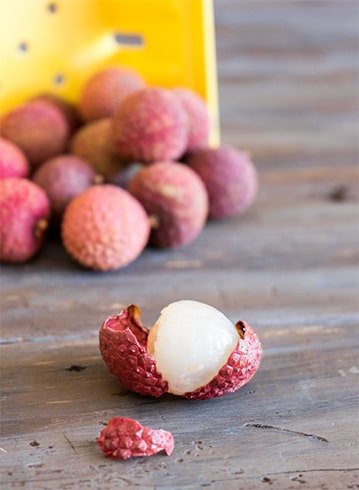
Source: oneingredientchef.com
8. Mitochondrial Health:
The pulp of lychees is highly packed with phenolic compounds and antioxidants. According to animal studies, the lychee pulp phenolics protect the body against liver injury by adjusting mitochondrial dysfunction.
9. Anti-viral Activity:
Lychee seeds contain proanthocyanidins known for showing effective anti-viral activity including herpes simplex virus and coxsackie virus.
10. Vitamin B:
Lychees are a rich source of Vitamin B complex like riboflavin, thiamine, and folates. These types of vitamins can allow our body to metabolize carbohydrates, fats, and proteins. It also contains Beta carotene which is known for strengthening immune system and improves the liver function.
11. Weight Loss:
The fruit has low calories, zero saturated fats or cholesterol, and rich in dietary fiber. They are really good for people wishing to lose weight.
sc:mediad]
Lychees For Skin:
Lychees are a great source of nutrients and Vitamin C known for benefitting skin. They benefit the skin in a lot of ways:
12. Improve Skin Health:
The presence of antioxidants greatly reduces the ageing process and improves skin health.
13. Prevent Premature Ageing Signs:
The presence of Vitamin C in lychees reduces age-related problems like premature ageing disorder. Regular indulgence of the fruit can also restore healthy ageing. They also contain oligonol which reduces ageing signs and dark spots. You can have the fruit in its raw form or use it as face packs.
14. Protection Against Free Radicals:
It has a high presence of antioxidants, Vitamin B-complex, Vitamin C, and phyto-nutrient flavonoids. The antioxidants protect the body against oxidative stress caused by UV radiation and pollution. It also neutralizes free radical cells and protect against skin damage. For this reason, lychees protect against inflammation and skin cancer.
15. Skin-friendly Nutrients
Lychees contain skin-friendly nutrients like copper, thiamin, and niacin. The presence of copper can speed up the healing process of damaged skin. Niacin boosts the skin hydration levels, while thiamin provides the body with metabolizing fats and protein.

Lychees For Hair:
Most of us long for a healthy scalp and hair. A balanced diet is essential for maintaining lustrous hair. As lychee is richly packed with Vitamin C, thiamin, and niacin, it benefits hair in a lot of ways:
16. Promoting Healthy Hair:
Lychees are richly packed with Vitamin C and play an effective role in boosting micro-circulation. It also ensures adequate blood supply to your hair follicles.

How To Select And Store?
Selection:
Fresh Lychee Fruit Tree are grown from June-October. The fruit gets fully ripened on the tree and does not ripen further after harvesting. Over-ripened fruits turn to dark brown in its exterior form. While purchasing lychees, select the fruits that are bright colored (light red to deep red). Look for skin that is tough but not dry. The inner pulp should be fresh. And if it tastes bitter, then know that the fruit is not ripened.
Also Read: Benefits Of Rambutan
Storage:
Lychees are known for their long shelf life and are kept at room temperature for five days. They can also be refrigerated for about five weeks. To avoid change of color and moisture loss, the fruit should be packed in a paper towel.
The fruit is also said to produce little ethylene and therefore should be packed at high humidity level. They are mostly dried, frozen, and canned for the purpose of exporting.
How to Eat Lychee?
If you are wondering How to Eat Lychee then here is the answer. The fruit has a leathery cover with a pink or red skin. You have to peel the skin of the fruit using your hands or knife. You can push the fruit using your thumb or knife. Peel off its skin. After cutting the top part, the flesh will come off with no trouble. Remove the skin and seeds. Proceed to consume its juicy flesh.
Litchi Fruit Side effects:
The powdered version of lychee seeds has immense health benefits. But consumption of the seed may cause side effects like bad digestive system.
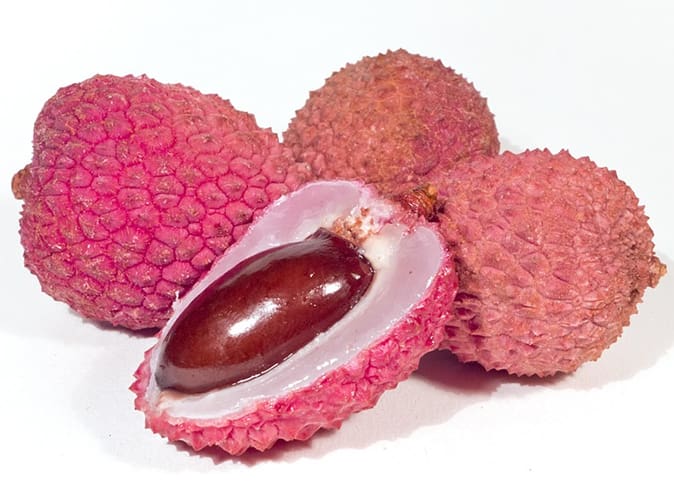
Source: pixabay.com
We have covered everything about Lychee Benefits and beyond. So include this wonderful fruit into your diet if you haven’t yet.
Hope this article was informative for you. Write in your opinions or feedback in the comment box below.
